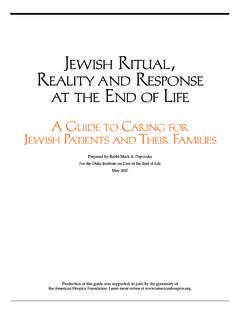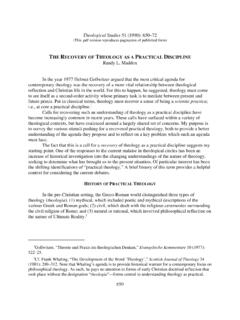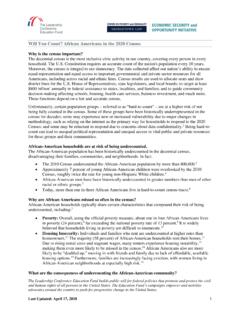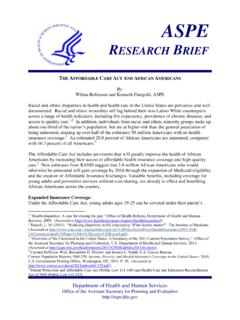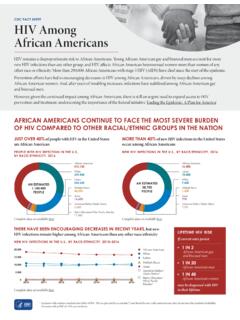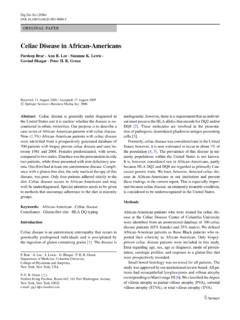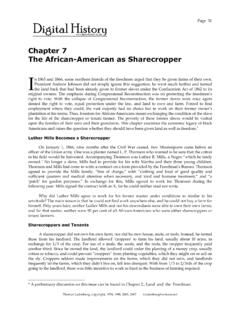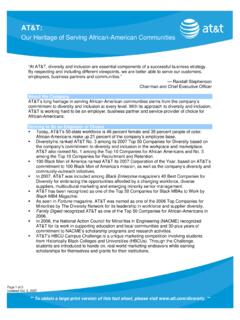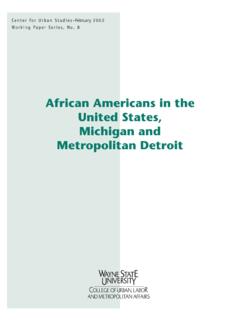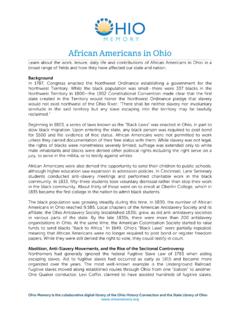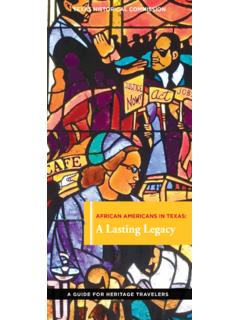Transcription of End-of-Life Care for African Americans - Duke Divinity School
1 IN COLLABORATION WITH:Duke Institute on care at the End of life Initiative to Improve Palliative care for African Americans (IIPCA) Supported by a grant from the Robert Wood Johnson FoundationKey Topics onEnd-of- life care forAfrican AmericansAn intellectual discourse derived from The Last Miles of the Way Home 2004 National Conference to ImproveEnd of life care for African Americans May 30, 2006 Dear Reader: On behalf of the project team, authors and participants, I welcome you to read the manuscripts that we have published in this electronic book form, titled Key Topics on End of life care for African Americans . These manuscripts represent the most important subject areas covered in a landmark national conference called The Last Miles of the Way Home , presented in Atlanta, Georgia in 2004. The Last Miles conference was the first of its kind, giving voice to issues in end of life decision-making and caregiving unique to African - american patients, families and communities.
2 The topics covered in this book range from the impact of health disparities on end of life decision-making to spiritual aspects of care at life s end, to sociological and cultural perspectives on death and dying and finally, even to health policy considerations. The authors represented here are leading thinkers in this field. This series of papers will provide useful information for individuals and organizations interested in increasing their understanding of African - american perspectives on End-of-Life care that influence important questions such as access to hospice and palliative care , and the quality of care delivered in those settings. We hope that these papers will lead others to do further scholarly work and spur others to think about demonstration projects and other practical programs that provide beacons to shine light on best practices for delivering quality End-of-Life care to African - american patients and families.
3 The Last Miles conference and the published papers represented here are products of ideas conceived under the guidance of the late Dr. Marian Secundy of Howard University. We dedicate this project to her memory. Richard Payne, MD. Esther Colliflower Director Duke Institute on care at the End of life Key Topics on End-of-Life care for African Americans Derived from The Last Miles of the Way Home 2004 National Conference IN TRIBUTE Who Always Spoke Truth to Power Marian Gray Secundy, PhD Dr. Secundy was the director of the Tuskegee University National Center for Bioethics in Research and Health care from 1999 to 2002. The first of its kind in the nation, the Center explored the core issues that underlie research about, and the medical treatment of, African Americans and other underserved rd ayor s own, Republic of South Africa, among others.
4 E l ealth are professionals in areas of ethics, human values in patient care and death and dying. fruit. This body of work is the realization of Dr. Secundy s vision, dedication and commitment. people. Between 1971 and 1999, she was the professor anddirector of the program in clinical ethics, HowaUniversity College of Medicine, Department of Community Health and Family Practice. Her research interests included the ethical dimensions of patient care and minority aging. Dr. Secundy had been a consultant to the Department of Health and Human Services and had served on several National Institutes of Health advisory panels. She was a former member of the MTask Force on Hospice Licensure in the District of Columbia and the National Capital Health Ministries. Dr. Secundy was a visiting scholar at the Pritzker School of Medicine (University ofChicago), the Health Policy Institute (University of San Francisco), and the University of Cape T Throughout her career Dr.
5 Secundy worked tirelessly to correct the racial injustices and insensitivities that have blighted the United States health care system for centuries and continuto this day. As a bioethicist with a background in social work, she understood the ethical legaand social consequences of race in the health care of African Americans , and she addressed these issues openly and boldly. A major focus of her work was on training and engaging hc It was Dr. Secundy who garnered funding from The Robert Wood Johnson Foundation for TheLast Miles of the Way Home conference. Unfortunately, she passed away before she could see her efforts bear May 30, 2006 Dear Readers, Education is the only solid bridge you can rely on to transport you over your troubled waters. So on that premise, I ll say to you: Use that bridge to get on the other side where you can stand up and be counted, thereby leaving footsteps in the sand of time for others to follow.
6 Strong and Beautiful Voices Quotations from Africans Throughout The Diaspora Author, Christine B. Forte My mentor and friend, the late Dr. Marian Gray Secundy, was a true visionary and as such, she led the charge to empower patients and their families to choose their individual paths for the final journey with respect, dignity and comfort. Moreover, Dr. Secundy firmly believed that in order to eradicate health care disparities and improve the overall quality of End-of-Life care received by African Americans , education is indeed the solid bridge by which we can begin to close the gap. I feel honored and privileged to have worked under her tutelage. The manuscripts, Key Topics on End-of-Life care for African Americans , are the culmination of Dr. Secundy s endeavors. The body of work presented here is from an esteemed group of leaders in their respective fields. The papers are intended to provide a platform for furthering the mission to provide culturally competent care to African Americans nearing the end of life .
7 I would like to thank each of the authors and commentators, as well as the entire Last Miles project team, for their contributions and untiring efforts on this project. Without their dedication and commitment, the Last Miles conference and these commissioned papers would never have come to fruition. As stated in Christine Forte s quote above, it is clear that education can empower a people and their community. I encourage the reader to embrace this mindset as you explore the various topics covered here and challenge all of us to forge new paths toward delivering equitable, quality care to African Americans , each leaving our own set of footsteps to be followed by those behind us. Sincerely, Sharon R. Latson Sharon R. Latson Co-Principal Investigator Key Topics on End-of-Life care for African Americans Principal Investigators Richard Payne, MD Gwendolyn London, D. Min Sharon R. Latson Authors Skaykh Ibrahim Abdul-Malik, EdD Fay Burrs, RN, BSN Kelvin Calloway, Myra Christopher LaVera Crawley, MD Joseph Dancy, Jr.
8 , PhD, MDiv, THM Willie Davis, PhD Diane Deese Michelle Grant Ervin, MD Harold Freeman, MD Bernice Harper, MSW, MSH, PhD Karla Holloway, PhD Camilla Hudson Bethsheba Johnson, APN, BC William Johnson, MD Sharon R. Latson Gwendolyn London, Richard Payne, MD Deacon Rosalyn Priester Gloria Ramsey, RN, JD Pernessa Seele Paul Smith, Robert Washington, PhD, MDiv Jeremiah Wright, Jr., Commentators Congresswoman Donna Christian Christensen, MD Andrea King Collier LaVone Hazell Beny Primm, MD September Williams, MD Kristy Woods, MD Case Study/Town Hall Meeting Moderator: George Strait Administrative Staff Diane Cohn Dana Hall Lisa Jordan Marilyn McKinney Olivia M. Porter Editor Kevin Sanders Web Site Developer Jon Goldstein Michelle Rudolph 1 Key Topics on End-of-Life care for African Americans 1. Historical Perspectives on Racial Attitudes and the Impact of Health care Disparities on End-of-Life care in the African american Community Harold Freeman, MD, Ralph Lauren Cancer and Prevention Center, New York, NY Richard Payne, MD, Duke Institute on care at the End of life , Durham, NC Commentary by: Kristy Woods, MD, Maya Angelou Center for Minority Health, Wake Forest University, Winston Salem, NC 2.
9 African american Perspectives on Pain & Palliative care LaVera Crawley, MD, Stanford University, Oakland, CA Richard Payne, MD, Duke Institute on care at the End of life , Durham, NC Commentary by: September Williams, MD, Laguna Honda Hospital San Francisco, CA 3. Palliative & Hospice care in HIV/AIDS A Community care Perspective Bethsheba Johnson, MSN,CNC,GNP-BC, Luck HIV Health care Center, Chicago, IL William Johnson, MD, Medical Director VITAS Healthcare Corporation, Chicago, IL Pernessa Seele, Balm of Gilead, New York, NY Commentary by: Beny Primm, MD, Addiction Research and Treatment Center, New York, NY 4. Spiritual care Near life s End including Grief and Loss in the African american Community Gwendolyn London, , London & Associates, Silver Spring, MD Robert Washington, PhD, MDiv, Montgomery Hospice, Rockville, MD 2 5.
10 End-of-Life care Ministry in the African american Church Kelvin Calloway, D. Min, AME Church, Los Angeles, CA Gwendolyn London, D. Min, London & Associates, Silver Spring, MD 6. African american Perspectives on Advance care Planning Camilla Hudson, Patient Advocate, Chicago, IL Sharon R. Latson, VITAS Healthcare Corporation, Chicago, IL Gloria Ramsey, RN, JD, USC Center for Health Disparities, Silver Spring, MD 7. Historical & Sociological Perspectives on Death and Dying in the African american Community Karla Holloway, PhD, Duke University, Durham, NC Commentary by: LaVone Hazell, Palliative care Training and Education Program (PTEP), New York, NY 8. The Future of Hospice care for African Americans : Clinical, Policy & Caregiver Perspectives Fay Burrs, RN, BSN National Hospice and Palliative care Organization HPCO, Alexandria, VA Michelle-Grant Ervin, MD, VITAS Healthcare Corporation, Washington, DC Bernice Harper, MSW, MSH, PhD, Center for Medicare & Medicaid Services, Washington, DC Commentary by: Congresswoman Donna Christian Christiansen, MD United States, Virgin Islands 9.


